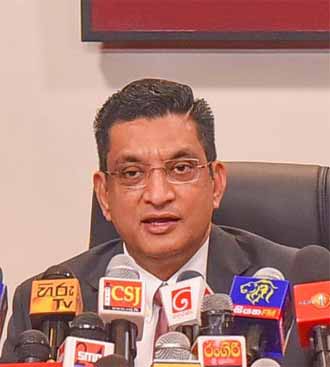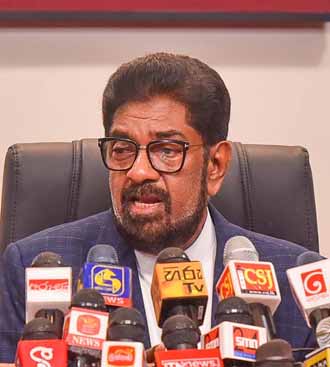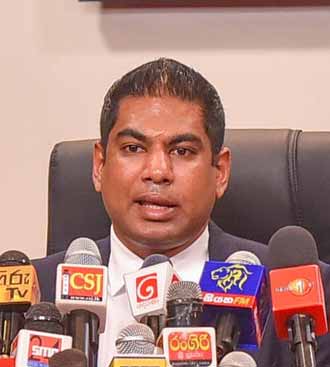Friday Feb 20, 2026
Friday Feb 20, 2026
Thursday, 30 November 2023 01:54 - - {{hitsCtrl.values.hits}}

Foreign Affairs Minister Ali Sabry

Environment Minister Keheliya Rambukwella

Power and Energy Minister Kanchana Wijesekera

Senior Presidential Adviser on Climate Change Ruwan Wijewardene
As the world gears up for COP 28, the Government yesterday said President Ranil Wickremesinghe is spearheading Sri Lanka’s delegation to the conference, which is set to tackle pressing climate change issues and to address critical decisions.
The conference will convene world leaders, public-private representatives, environmentalists, and scholars. The President envisions three key focal points: the launch of the Climate Justice Forum, the Tropical Belt Initiative and the establishment of a Climate Change University.
In a visionary move initiated by President Wickremesinghe, Sri Lanka is set to launch the Climate Justice Forum during the upcoming COP 28 Conference in Dubai, scheduled from 30 November to 12 December.
The President, accompanied by three ministers and two opposition MPs, along with 20 young participants passionate about environmental concerns, will engage in this pivotal conference in Dubai. The primary objective is to harness support and collaboration from countries in the Tropical Belt to influence policy-making decisions on a global scale.
Addressing the special press briefing on COP 28 participation yesterday, Foreign Affairs Minister Ali Sabry said that President Wickremesinghe’s concept behind the Climate Justice Forum aims to address the pressing issue of climate change and exert influence, particularly on the Global North. Sri Lanka, recognising the critical role it plays in the fight against climate change, seeks to actively engage with the international community to garner support for its ground-breaking initiatives.
Among the key agendas to be presented and discussed during the COP 28 Conference are Sri Lanka’s recently introduced roadmaps on Green Hydrogen and Sustainable Energy. The country is also seeking endorsement for the establishment of a Climate Change University, signalling its commitment to fostering education and research in sustainable practices.
Climate change has emerged as one of the most crucial challenges in the world, and Sri Lanka, like many other nations, is making determined efforts to contribute to global mitigation strategies. Minister Ali Sabry emphasised the tangible impact of climate change and underscored the imperative for global cooperation. He highlighted the critical role of the United Nations Climate Change Conference, held annually since the pre-industrial revolution era, with a focus on reducing carbon emissions to limit global warming to 1.5 degrees °C.
A noteworthy aspect of Sri Lanka’s approach is recognising the plight of the approximately 136 countries within the tropical belt, which bear the brunt of the adverse impacts of climate change. By championing initiatives like the Climate Justice Forum, Sri Lanka seeks to unite nations facing similar challenges and collectively address the urgent need for climate action.
Drawing attention to the vulnerability of tropical countries, which are housing 40% of the global population, faces disproportionate environmental consequences. The Minister stressed the importance of concerted efforts in addressing climate challenges. The minister articulated Sri Lanka’s proactive stance at the conference, advocating for principled decisions to combat environmental pollution and promote transformative initiatives.
Additionally, in line with the President’s guidance, Sri Lanka proposes the establishment of an international university dedicated to climate change, emphasising the need for rigorous scientific study in this domain, as well as securing international investments to mitigate climate change. Several tropical belt nations have expressed their willingness to support this initiative.
Environment Minister Keheliya Rambukwella highlighted the evolving landscape of environmental discussions in the contemporary world, where economic and security concerns often take precedence. He emphasised the growing importance of environmental issues, signalling a shift in global priorities.
In today’s discourse, the Minister underscored that environmental considerations have gained prominence, recognising the critical role they play in shaping the world. The Minister acknowledged that the primary cause of environmental damage lies in the historical neglect of ecological concerns. The Minister expressed concern about the immeasurable environmental harm caused by human activities, particularly during the Industrial Revolution.
Reflecting on the international commitments made in 2015, Minister Rambukwella noted the gap between these agreements and their practical implementation on the ground. He highlighted the significant pressure faced by tropical countries, attributing it to the actions of developed nations. Notably, this year’s conference assumes heightened significance within the United Nations framework, given the urgency to establish a robust foundation for addressing environmental challenges and preventing further damage.
Power and Energy Minister Kanchana Wijesekera, emphasised the pivotal role of this year’s conference in advancing Sri Lanka’s renewable energy agenda. He highlighted the significance of the opportunity to generate electricity through sustainable resources, emphasising that plans for this initiative were presented last year.
He noted the findings of survey reports by global institutions, such as the World Bank and development agencies, indicating the substantial potential for electricity generation to meet both national and regional needs. Drawing attention to the recently unveiled green hydrogen roadmap of Sri Lanka, he outlined the strategy to leverage offshore renewable potential in the Northern Province.
Expressing the challenges in securing financial support for energy projects in Sri Lanka, the Minister stressed the importance of obtaining technical and financial assistance, especially from international organisations. He underscored the uniqueness of this year’s conference, providing a dedicated platform for Sri Lanka to engage with local and foreign organisations and make crucial decisions.
Minister Wijesekera outlined the country’s commitment to obtaining 70% of its energy from renewable sources by 2030, with a focus on excluding fossil fuels. He called for the support of state leaders in achieving this ambitious target, highlighting the need for financial backing. The Minister estimated a requirement of at least $ 12 billion by 2030 for the successful implementation of renewable energy projects and expressed confidence that the conference would serve as a crucial platform for addressing these financial considerations.
Senior Presidential Adviser on Climate Change Ruwan Wijewardene underscored the global significance of the upcoming conference, labelling it as one of the most crucial gatherings in the world. He highlighted the participation of Government leaders from influential nations, major corporations, and religious leaders, making it an ideal platform to address the impacts of climate change and seek necessary solutions.
Drawing attention to the economic consequences of climate change for Sri Lanka, Wijewardene noted the substantial annual financial losses incurred by the country. Referring to insights from World Bank experts, he emphasised that, by the year 2050, Sri Lanka is projected to face a loss of 1.2% of its gross domestic income due to climate-related issues. In this context, he advocated for leveraging the conference as an opportunity to devise strategies to minimise these losses and address the challenges posed by climate change.
Sri Lanka takes pride in submitting a substantial number of proposals to this year’s conference, underlining the commitment to translate proposals into actionable initiatives on the ground and, for the first time, will showcase its own platform, signalling the nation’s commitment to global climate action.